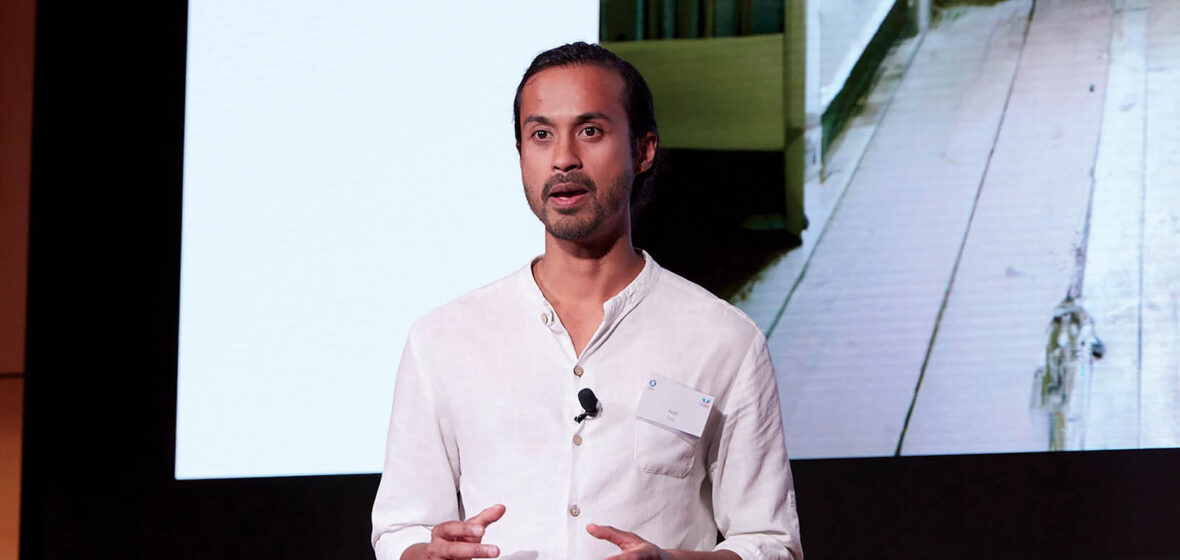Noel Lim, the CEO and co-founder of charity and social enterprise Anika Legal, gives an insight into its mission to keep renters in safe homes, and the transformative role technology can play in improving access to justice.
Why was it important to concentrate your service on tenancy issues?
We’re in the middle of a housing crisis and there are millions of people who can’t get the support they need. For that reason, this is the most impactful service we can offer. By specialising in tenancy, we are well placed to build the creative solutions to actually move the dial on the issue. Anika is firmly centred around the renter. At the start of the journey five years ago, we had the idea of a student powered service model. And then we found an area of law where there was unmet need that was simple enough for law students to meaningfully contribute to, and something that universities were willing to pay for their law students to train on. The middle of that three-circle Venn diagram included a few things. But the front runner was housing.
We provide a range of tenancy services: we help renters get their unsafe homes repaired; recover unfairly withheld bonds; and fight unfair evictions. Our current expansion plan is to move into other areas of law that still focus on assisting renters to stay in safe homes. The next most common problem that we see in our client base is utility debt. Many rentals we see are energy inefficient; they’ve got holes which let out heat, they’re not well insulated or they have leaky showers. Not only are people living in unsafe homes, but they are also racking up utility debt they can’t pay, which hinders their ability to pay rent. It’s a vicious cycle. Imagine you’re a renter and you ask for some energy efficient improvements that aren’t obligatory. There’s a power dynamic there, and it’s one of the aspects of the system that needs to be fixed. We are going to continue helping renters fix their homes and manage their energy debt, plus look at why this problem exists in the first place and what interventions and reform need to happen.
How are you meeting the soaring need for Anika’s service during a time when so many are facing hardship due to the rising cost of living?
Anika’s vision is a world where everyone can access justice. Where everyone can access a safe, secure, affordable home that supports their quality of life. The need we are seeing is so huge that we really have to think of how we are going to tackle the scale of the problem. We provide free legal services for renters to stay in safe homes. But there are eight million renters in Victoria (where we are currently based), and 82 per cent of them are in rental stress, and half of them need repairs to the home. We are not going to be able to provide legal services for every single one.
We had a client, a woman with a child, who was renting a home with live wires poking out of the walls because an air conditioner had fallen through the ceiling. The rental provider ignored the requests for assistance. After many months, she found us, and we helped get the home repaired. She got the legal outcome, but she still endured nine months of feeling frustrated, disrespected and like she couldn’t provide a safe home for her child. That is not justice. With this in mind, we also want to prioritise innovative and large-scale solutions to tackle the problem. One of those is looking at how we get more resources to the sector through social enterprise. Our lawyers (a mix of employees and volunteers) are supported by law students who want practical training, and the student programs are funded by university law schools who want to provide their students with practical training. These are resources we are bringing to the sector that aren’t already there.
We are also looking at digital tools that can be used by renters to enforce their rights, and, most importantly, we are advocating for a fairer system. There are so many things that need to change about the system, and the best way to do that is to build an evidence base from quantitative data so we can demonstrate to decision makers the social return on investment.
“The need that we are seeing is so huge that we really have to think of how we are going to tackle the scale of the problem.”
How are you improving access to justice via technology and digital innovation?
There are three ways we’re using technology to drive those innovative large-scale solutions. The first one is that student-powered service model. This is not a new thing, and there are community legal centres who do this, but the difference is that they don’t often bring in more money than they cost to run. Law students take a lot of effort to supervise, and sometimes it is more cost effective to just pay the lawyer to do the work. What we did to make this model viable is we used technology to streamline the role of the supervising lawyer. We’ve got education technology to guide the students and allow them to make the right decisions by themselves. The legal technology removes the administrative workload from the lawyer, and we shifted the ratio of law students to supervising lawyers. Traditionally, it would be one lawyer supervising five students. We changed that ratio to one to 30 so the student programs cost less money than they bring in.
Second, we supplement our services with digital tools. Compensation for poor conditions or fighting a rent increase are things that a renter can self-advocate for if they are assisted by a digital tool. We are looking at technology to build these tools and create those highly scalable interventions that we need.
The third area is to ensure our systemic advocacy efforts are data driven. This is perhaps the least shiny but most important thing for providing the change that we need. We need to build the case for why we need to change the system to convince the policy and decision makers. Of the eight million renters, seven million are private renters and very few services will provide casework to them. What that means is we don’t have a deep understanding of the problems the majority of renters are going through. We might have a one-off phone call or email explaining their legal advice, but no idea about whether they did anything with that advice or whether the problem was resolved. Casework gives data opportunity, but even that is not enough on its own. Even if you do have the data opportunity, you need to be able to make sense of it and draw insights from it and have storage and reporting capabilities. The not-for-profit sector has traditionally been behind on this.
We collect data all the way through the process of helping clients. We found out recently that 40 per cent of our repairs clients (who have good cases) chose not to go to the Tribunal because they were too scared. That is a clear indication that justice in that particular group is not being done. What’s more is that a landlord or agent knows this, and can weaponise a hearing to achieve a goal for them. This is the sort of compelling data which shows that we need to change how we resolve these disputes, which shows these issues are hindering the administration of justice.

What impact is AI having on your service delivery?
Generative AI is a particularly exciting prospect for the legal assistance sector. The low-hanging fruit here is using generative AI to create efficiencies in service delivery. Now that we have generative AI, we can do things like summarise entire cases. There are potentially dozens of documents, files and letters that can all be summarised quickly, so every time you are referring a case, rather than wading through documents to familiarise yourself, the issues can be summarised instead. If this is done right, identifying risks and accessibility needs can be time-consuming. But generative AI, if built purposefully, can change that. That will mean we can do a whole lot more with fewer resources. That’s the service delivery efficiency part of it.
The other part is using generative AI to enable new types of digital tools. Having generative AI speak directly to the client is a risk. But one cool thing we can do with Anika’s unique model is have a student in the middle. Most issues come up when generative AI is producing legal information for a client. If you have a human in the loop, you can make sure that something risky or incorrect doesn’t go out and you can make sure that you are learning from the mistakes. That’s hard to do at scale when you have to pay a lawyer to do it all; it’s very expensive and already a resource constraints factor. But when you have law student volunteers, they can be the human in the loop that helps to moderate the risk and trains the generative AI to improve on itself. That is a pretty exciting prospect. Unfortunately I don’t think much of the potential will be reached in the access to justice space because this requires significant resources, which the not-for-profit sector does not have.
Tell us about the volunteers who play a core part in your model.
Anika has five full-time employees. We are about to hire our sixth, who is a software developer. All our tech to date has been developed by a volunteer software developer. A lot of what we’ve been able to achieve is through volunteers. Currently we have 60 volunteers, and we’ve also placed a few hundred law students in our internship programs throughout the years. The support we get from volunteers is very much essential to what we do. Not only is it the support for the lawyers through the student programs, but it’s also developing our tech, doing our marketing and helping with our finances.
We’ve been particularly successful in recruiting and engaging volunteers. Part of our mission to provide access to justice is by leveraging the power of law students. It’s not that easy. You need to design the entire system around the law student so they can meaningfully contribute. We are getting some really valuable capacity that is helping us fulfil our mission and keep people in safe homes. The volunteers are learning, contributing to that impact, meeting like-minded people who care about social impact and getting career development opportunities. It takes a lot of work but it’s absolutely worth it. Because it is a volunteer role, you know the person coming in wants to do it for the right reasons, and that makes the workplace culture great because everyone is on the same page; we share a purpose. Not only is it meaningful, but it’s also really fun.
“Most issues come up when generative AI is producing legal information for a client. If you have a human in the loop, you can make sure that something risky or incorrect doesn’t go out and you can make sure that you are learning from the mistakes. That’s hard to do at scale when you have to pay a lawyer to do it all.”
What keeps you coming back to work each day while trying to achieve something on such a large scale?
This is a very challenging role, but by far the most fun I’ve had. I get up every day excited to work. It’s never a slog and I never feel any dread, so I consider myself fortunate to have this role. Why is this important? Four billion people in the world don’t have access to justice. That is more than half of the world. And what we’ve seen in the five years since Anika has been around is that we can do a lot better. There are ways to do better, and we’re also seeing first-hand the impact it has when we do better. The mother that we assisted to repair her home was very grateful for us, but said she had felt she was undeserving of dignity and an inadequate mother. She told us that our service showed her not only how to get her house fixed, but also that she was deserving. How powerful is that? It’s terrible that people feel that way, but it’s amazing to be able to help them. That, and then doing it on a massive scale, and trying to find new ways to do it better, invigorates me.
Tell us a little about the flexible secondments you offer.
Many lawyers, regardless if they are in a large corporate firm or a boutique practice, want to contribute to access to justice. But not everyone can volunteer during the week or undertake a secondment to a community legal centre because of demands to schedule or because they don’t have the requisite experience. Something exciting that Anika has started is our flexible secondments. Lawyers can sign up to volunteer and supervise our law students to provide this critical legal support to keep renters in safe homes. Because we’ve created a system which allows that contribution to be flexible and remote, it means any lawyer can do it, even if they have a hectic schedule. They can get involved to the extent that their schedule allows. We provide all the training. This democratises being able to contribute to access to justice, and by connecting people to that impact it makes for a more socially conscious legal profession. That’s some of the cultural change that would really drive access to justice in a big way. We’ve got MinterEllison, Hall & Wilcox, and Maddox trialling it, and we are hoping to have a few more firms get involved.




